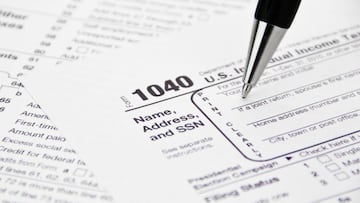How long do I have to my keep tax returns?
You’ve filed your taxes and now you’re wondering what to do with those papers, depending on what you need them for determines how long you should keep them.

Clutter seems an ever constant in our lives, perhaps you’ve got bitten by the Marie Kondo tidying up bug and you’re looking at those old tax filing documents. They most likely don’t “bring you joy” but you’ll need to hold on to them for a while at least.
Depending on what kind of papers you’re holding on to and what purpose they may serve in the future will determine whether it’s time for the shredder or they need a safe place for eternity. So what can stay and what can go?
Also see:
- IRS announces possible delays in distributing tax returns
- Millions of Americans could receive an unemployment tax break this year
- Benefits of delaying Child Tax Credit payments
- Children under 18 at end of 2021 will qualify for Child Tax Credit payments
How long to keep tax returns
The minimum time that you will need to hold on to your tax return and supporting documents is three years from the time that you filed them with the Internal Revenue Service (IRS) or the due date, whichever was later. You will want to keep your tax return form with your supporting forms; W-2s, 1099 or other, and documents; records for itemized deductions, child care expenses and any other documents that you used to report your tax liability.
However, you may need to keep them around for longer if you didn’t file a standard tax return. The IRS has different statute of limitations whereby you can adjust the refund you can claim or the IRS can audit your tax return.
The Interactive Tax Assistant is an #IRS tool that offers reliable answers to your tax law questions whenever they come up. Visit https://t.co/5OdM6EQEKl pic.twitter.com/Ic7G2Fy5u2
— IRSnews (@IRSnews) May 23, 2021
The three-year rule
The IRS gives tax payers three years to claim any tax refund that they have coming to them, but the agency also has three years to audit your tax return or assess any additional tax due, and ten years to collect any tax that you may owe. The clock starts ticking for the statute of limitations from the due date for that year or the date the taxpayer filed their tax return, whichever is later. The filing date could be later than the due date if you filed for an extension. The time reduces to two years to claim a refund for a certain year if you paid your taxes late for that year.
Statue of limitations longer than three years
There are several situations where the statute of limitations can be longer than three years. The IRS has six years from the date a return is filed to assess additional tax if the taxpayer omits more than 25% of their gross income from a tax return. Additionally, if a taxpayer omits more than $5,000 on income related to undisclosed foreign financial assets the IRS also has six years to assess additional tax. And there is no statute of limitations if the taxpayer files a fraudulent tax return or fails to file.
This comprehensive #IRS publication covers the federal income tax rules and laws so that you pay only the tax you owe and no more https://t.co/8W3mEaXNV2 pic.twitter.com/IDmLqrFvqZ
— IRSnews (@IRSnews) May 20, 2021
Taxpayers that claim a refund resulting from deductions for bad debt or worthless securities must keep records for seven years. As well, tax records for retirement accounts such as IRAs should be held until seven years after the account has been closed.
Related stories
Generally, with regards to amortizing, depreciating, or buying or selling property, which can be land or buildings as well as stocks, equipment and other assets, records should be kept until the period of limitations expires for the year you dispose of the property.
How should I store my documents?
You will want to keep your tax records just as you would any other important documents; insurance policies, deeds, mortgages, where they will be safe from fire or flood. You can also create a digital copy of your records by scanning them and then placing them on a secure encrypted hard drive. When you dispose of your tax documents you will want to shred them to prevent identity theft or anyone getting their hands on any personal information.


